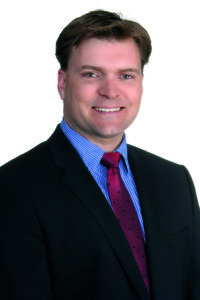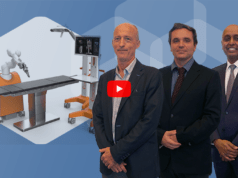
The world-first collaboration between interventional oncology (IO) and radiation oncology, embraced by the Trans-Tasman Radiation Oncology Group (TROG), continues to bear fruit, with the inaugural Clinical Interventional Oncology Symposium to be held in Melbourne next March. The two-day event will feature in the TROG annual scientific meeting at the Melbourne Cricket Ground on 14–15 March 2019, Melbourne, Australia.
The inaugural clinical Interventional Oncology Symposium will be a dedicated workshop on all aspects of clinical oncology relevant to interventional radiologists. Internationally renowned oncology experts Constantinos Sofocleous (Memorial Sloan Kettering Cancer Center, New York, USA), Andreas Adam (Guy’s and St Thomas’ Hospital, London, UK) and Lizbeth Kenny (Royal Brisbane and Women’s Hospital, Brisbane, Australia) will join with local expert medical oncologists, radiation oncologists, pathologists, surgeons and interventional radiologists to present a wide-ranging syllabus that will highlight the importance of high-quality clinical practice in IO.
IO is a dynamic and ever-expanding profession, and practising interventional radiologists (IRs) must be up to date across a wide range of clinical and technical skills. These sessions will emphasise the need for interventional radiologists to assume responsibility for the clinical care of their patients, and to develop a pattern of practice similar to that of all other oncological disciplines. In turn, this will help IRs to take image-guided interventions into the “mainstream” of oncology.
Teaching will include overviews of tumour biology, pathology, treatment options, clinical algorithms and the critical role that IO has to play in the diagnosis and clinical management of cancer. Sessions will also focus on clinical skills relevant to IR, including procedural sedation, post-procedure analgesia, how to establish and grow an IO clinic, and future IO research areas.
Unlike other IO workshops, the Clinical IO Symposium will not focus on expert technical explanations about how to perform procedures or “hands-on” displays. Instead, the symposium aims to educate IRs about how the IO techniques they perform fit into treatment algorithms, when they should be considered, and how to assess oncology patients.
Kenny, TROG Interventional Oncology Interest Group co-chair, said she was excited to participate in what is another world-first development involving interventional oncology and radiation oncology. “To the best of our knowledge, this is the first time that an IO workshop has been wholly dedicated to imparting purely clinical aspects of interventional oncology,” Kenny commented.
“Whilst quality assurance around how an interventional radiologist performs a procedure is critically important, it is equally necessary for IRs to be able to assess patients clinically and to know when certain interventions are appropriate.
“I am thrilled that radiation oncology and interventional oncology, both using image-guided focal therapy, are coming together in this way. We have so much to learn from each other,” added Kenny.
Adam, a well-known advocate of interventional oncology in Australia and New Zealand, was impressed by the unique approach. “Interventional oncology can by practised safely only as a clinical discipline. If interventional oncologists do not assume primary clinical responsibility for the patients they treat, they cannot ensure optimal care and run the risk of errors. For example, if follow-up of patients undergoing percutaneous ablation is delegated to the referring physician, delays in the diagnosis of recurrent or residual tumour can occur, and potentially treatable disease can become untreatable.
Adam added: “Interventional oncology is already making a significant contribution to contemporary cancer care, but has enormous unrealised potential, which can be harnessed only by its practitioners becoming fully-fledged clinicians. Interventional oncologists should take pride not in their technical expertise, which should be assumed and taken for granted, but in being ‘proper doctors’, like all other oncologists. This is the main value of this innovative workshop.”
“Interventional radiologists need good clinical training to support their technical skills,” said Nicholas Brown, overall symposium convenor, co-chair of the IO Interest Group and chair of the of the RANZCR Interventional Radiology Committee. “We hope that by emphasising the clinical aspects of interventional practice the workshop will help IRs to fulfil their role as clinicians, and develop IO into the mainstream.”
Susan Goode, TROG Cancer Research CEO, said her organisation was delighted to once again incorporate interventional oncology into its annual meeting and was excited about exploring the potential for further collaboration on education, training and research. “This will be the second year that IO has been integrated into the TROG Cancer Research programme, and based on the great response in 2018, next year is promising to be even more successful,” said Goode.
In a plenary address in the main scientific programme, Constantinos Sofocleous will outline the important role of interventional radiologists in modern oncology, and will explain how collaboration between oncological disciplines can benefit patients.
Interventional radiologists at any stage in their career are encouraged to attend and learn more about important concepts in clinical oncology for the modern interventional radiologist. This course is also highly recommended to registrars, fellows and interventional radiologists wanting to develop their practice in IO.
The symposium is supported by an educational grant from Terumo Interventional Systems.













